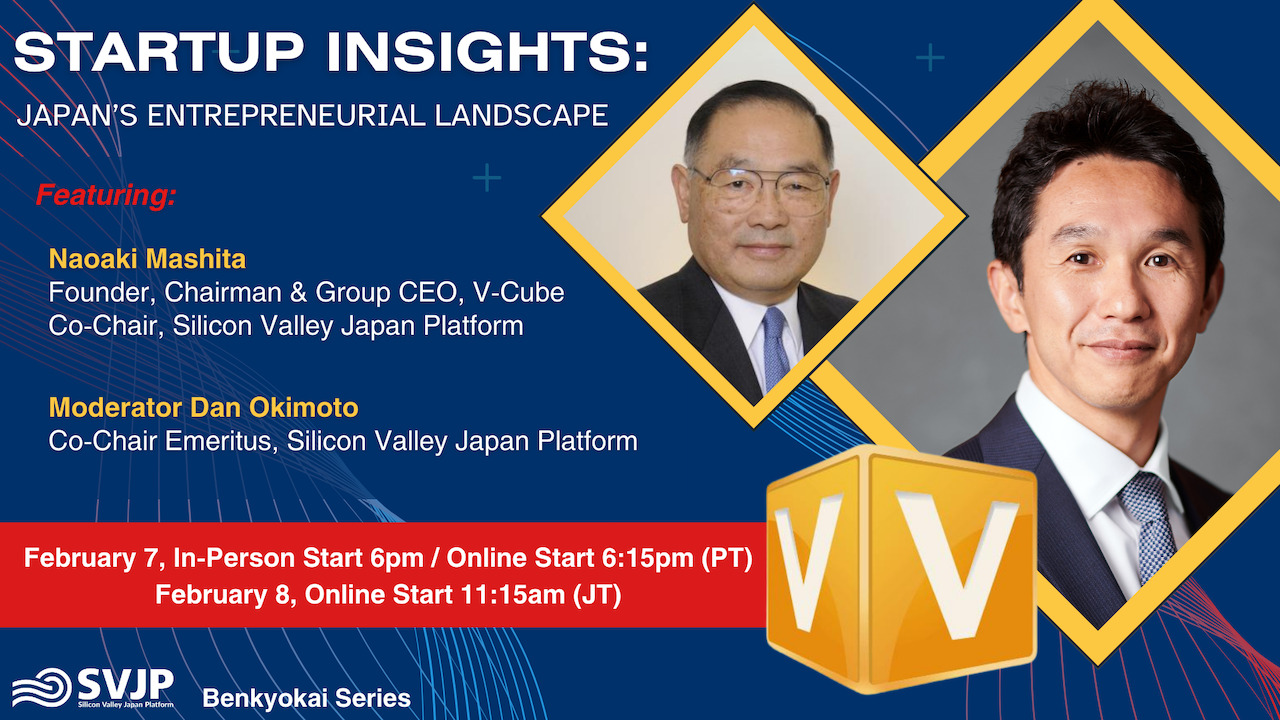Benkyokai
Startup Insights: Japan’s Entrepreneurial Landscape

There is a long-standing perception of Japan as a society that does not tolerate failure. Craftsmanship techniques are carefully passed down from generation to generation, honed and repeated to perfection. Innovation, on the other hand, can often be considered a slow and culturally resistant process. Yet even as these stereotypes persist, Japanese entrepreneurs continue to break through expectations with cutting edge technologies and unicorn startups. In the current age of rapid digital transformations and thriving entrepreneurial ecosystems, is Japan truly lagging behind in innovation?
On February 7, 6:00pm (In-person); 6:15pm PT // February 8, 11:15 am JT (Online), the SVJP Benkyokai investigates the current state of Japan’s startup landscape. The SVJP is pleased to host visiting SVJP Co-Chair Naoaki Mashita as the session’s guest speaker. Naoaki will draw on his personal experiences as an entrepreneur and founder of V-Cube to provide key insights into Japan’s startup policies. Moderating the discussion will be SVJP Co-Chair Emeritus Dan Okimoto. The event will serve not only as a fascinating pulse check for Japanese entrepreneurship, but also as a poignant moment for our community to meet the next Co-Chair carrying on the SVJP mission.
SPEAKERS
Naoaki Mashita
Naoaki Mashita was born in 1977 and obtained a master’s degree in computer science from Keio University. During his time at Keio University in 1998, he established V-cube Internet Inc. (now V-cube Inc.) which specializes in web solutions. Later on, the company shifted its focus towards video communication, primarily web conferences and online events. In 2013, the company was listed on the Tokyo Stock Exchange and is currently on its Prime Market. In the same year, he founded Sensyn Robotics (formerly V-Cube Robotics) which offers solutions using robotics such as drones. He also acquired Wizlearn Technologies Pte. Ltd. in Singapore, started the Telecube business in 2017, and acquired Xyvid Inc. in the USA in 2021. He has been actively involved in new ventures and international expansion. In 2022, he took up the role of Chairman and Group CEO. He is the Vice Chair of the Japan Association of Corporate Executives and the Chairman of the Regulatory Reform Committee. From 2023, he serves as an external director for Sumitomo Mitsui Trust Bank, Ushio Electric, and MICIN, and also chairs the Japanese government’s Regulatory Reform Promotion Council.
He lives primarily in three countries: Singapore, San Francisco, and Japan. With a mission to realize an “Even” society, he addresses challenges such as urban concentration, an aging population with declining birth rates, long working hours, and disparities in education and healthcare. Through visual communication, he aims to solve these issues, striving for a society where all its members have equal opportunities.
Dan Okimoto
Dr. Daniel I. Okimoto is Co-Chair Emeritus of the Silicon Valley Japan Platform. He is Professor Emeritus, Department of Political Science at Stanford University. In 1978, Professor Okimoto co-founded the Walter H. Shorenstein Asia/Pacific Research Center at Stanford University, a leading center for scholarly research, public policy analysis, and policy outreach, where he served as the Director for more than ten years. He has been Vice-Chairman of the Japan Committee of the National Research Council at the National Academy of Sciences, and a member of the Advisory Council of the Department of Politics at Princeton University. In 2004, Professor Okimoto received the Japanese Foreign Minister’s Commendation, recognizing his contributions to US-Japan relations during the 150th year celebration of bilateral relations. In 2007, he was awarded the “Order of the Rising Sun with Goldray Neck Ribbon” by Prime Minister Shinzo Abe and the Japanese government. In 2009, Professor Okimoto was chosen for “The Lifetime Achievement Award” by the Keizai Society of Silicon Valley. In 2013, President Barack Obama appointed Professor Okimoto as one of twenty-six distinguished scholars who have been selected to serve as members of the National Council of the Humanities.
Professor Okimoto graduated from Princeton University with a Bachelor of Arts degree, received his Master’s Degree from Harvard University, and earned his Doctoral Degree in Political Science from the University of Michigan. He is the author and editor of many books and articles, including Between MITI and the Market: Japanese Industrial Policy for High Technology (Stanford University Press); The Political Economy of Japan (Stanford University Press); and Competitive Edge: The Semiconductor Industry in the U.S. and Japan (Stanford University)